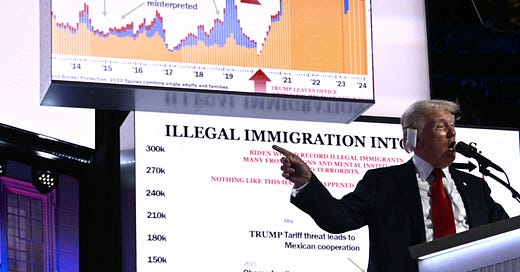Trump’s Immigration Talk vs. Trump’s Economy Talk
His anti-immigrant policies would kill the goose that laid the golden egg.
DONALD TRUMP IS COUNTING ON being able to fool most of the people, if not all the time then at least now—election season. He thinks us too stupid to see the self-contradictory nature of his policies on immigration and the economy.
On immigration, he has said that on “Day One” of his presidency, he will “begin the largest deportation operation in American history.” Estimates of those he would have the military and police round up have soared as high as 15 to 20 million people. His recent targeting of Haitian workers in Springfield, Ohio, who are in the United States legally, tells us that he’s not just talking about deporting the undocumented.
Put aside for the moment the cruel family separations to come if he is elected. Forget the immorality, illegality, and mistakes that will occur. Think practically. As Bloomberg News has reported, even without his abhorrent plans, “US employers will confront a shortage of some 6 million workers within a decade,” according to a recent analysis.
Part of the problem, the reporting says, is that the future American labor force is not “a match for the industries expected to need more labor—including health care, construction, and trades such as plumbing and car maintenance.”
Your own experience may confirm that. Look around if you need work on your car or home, rented or owned. Who fixes it? Who cleans it? What percentage of people who do these jobs in your town are first- or second-generation immigrants? Who does the economically “essential” work—relating to health, infrastructure, manufacturing, service, food, and safety? In most states, immigrants far outnumber native-born workers in those jobs.
So just imagine the effects on the economy if Trump were to become president and implement his plan for mass deportations. It would likely be not more than six months before the economy would cave in on itself.
Voters seem to be catching on. Recent polls (e.g., Quinnipiac, AP-NORC) show that the guy who used to lead by double digits on both immigration and the economy is now neck-and-neck.
News outlets, too, seem to have gotten the memo. On September 21, Ivana Saric highlighted Trump’s self-defeating policies in Axios:
Former President Trump’s vow to lower food prices clashes with his love of tariffs and desire to deport migrant workers with economists warning those steps would drive up consumer prices at a time inflation is finally cooling.
Trump’s plans for mass deportations would also conflict with getting food prices back to pre-pandemic levels. “The U.S. food industry relies heavily on migrant labor, including undocumented migrants, for jobs like harvesting and processing crops and meatpacking,” wrote Saric, paraphrasing agriculture policy analyst Joseph Glauber. “Replacing migrant workers with Americans or machines could add to the cost of food.”
As for Trump’s continually flogging his plan to double tariffs, the effect would be extremely inflationary:
Restricting imports via tariffs . . . would “almost certainly” . . . “lead to higher prices,” David Ortega, a food economist at Michigan State University, told Axios.
Still, Trump triples down on extremist memes about Haitians eating pets, memes that originated from neo-Nazis, according to the Wall Street Journal. Ohio’s Republican governor, Mike DeWine, said last week that the hate-mongering must “stop.”
DeWine explained, in effect, how Springfield, where he was born, illustrates the synergy between hard-working immigrants and an economic boom. There, as the Journal put it, the Haitians “were welcomed by evangelical groups and employers alike” to help revive a moribund local economy:
Business owners said they were grateful to have workers eager to work long shifts and do what it took to meet production goals. New subdivisions sprung up in the cornfields outside town. New restaurants opened.
The irony is that by falsely claiming that a black Haitian American carrying dead geese had stolen them from a public park and intended to eat them, Donald Trump has embraced hateful rhetoric and policy that would kill the goose that laid the golden egg.
Meanwhile, as Bloomberg reports, Kamala Harris veers center, even toward something that resembles the traditional Republican position: pro-growth capitalist, particularly in her proposed tax cuts for small business entrepreneurs. At the same time, the Journal tells us, she is courting corporate leaders because she stands for economic stability that Trump tariffs would disrupt.
The former president has long made wild conspiracy theories and chaos his brands, so there’s no surprise that he would resort to spinning bizarre lies, especially as he becomes politically desperate. The question now is whether, seeing how his lies contradict one another and harm the country, enough voters will reject him—proving the old saying right yet again: that even a congenital con man can’t fool all the people all the time.






